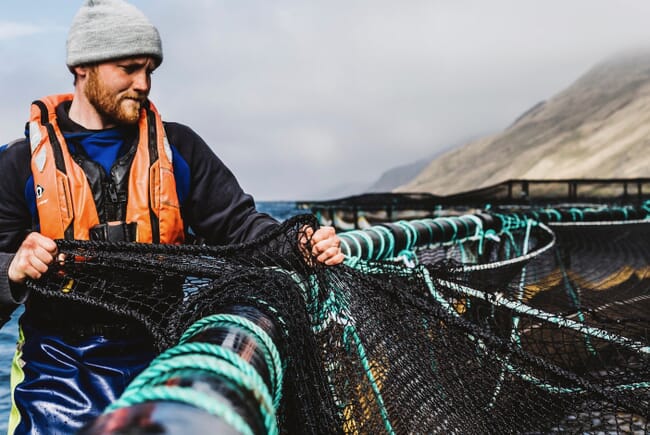In the first six months of the current reporting period (February 2019 – January 2020), the salmon grower saw two seal deaths across its 43-strong estate of marine farms; a reduction of five compared with the same period last year, six compared with 2017 and seven compared with 2016.

Scottish Sea Farms’ Managing Director Jim Gallagher said: “We won’t be happy until we achieve zero seal deaths, however our multi-million pound investment to roll out protective Seal Pro netting across as many of our farms as possible, as quickly as possible, is another example of our commitment to farm as responsibly and as sustainably as we can. Not only do the tougher, more rigid nets help to deter seals, but by protecting our salmon from the stress of predation and the subsequent health challenges that can cause they also contribute to fish welfare.”
With the optimum time to install the new netting systems being ahead of each new crop, Scottish Sea Farms has now equipped over half of its marine farms with Seal Pro nets at a cost of £4.2 million, with a further £1.5 million worth of nets set to be deployed between August and October 2019, bringing the total investment to date to £5.7 million – with more to follow.
Included in the latest roll-out will be next generation Seal Pro Excel netting which has been engineered to be the strongest, most unyielding version yet offering even greater protection.
Of the two farms that have seen seal shootings in this reporting period, one will be equipped with the new netting ahead of its latest crop next year while the other farm has had Seal Pro netting in place for over a year.
Scottish Sea Farms’ Head of Fish Health Dr Ralph Bickerdike commented: “Seals naturally feed on a variety of wild fish and other marine life and are thought to consume up to 7kg a day, depending on species. In the hunt for food, seals are occasionally relocating from farms that have Seal Pro nets to nearby farms that have previously had no significant seal challenge, hence our drive to protect all farms. We’ve also seen seals climb up and into pens. Both types of event happened earlier this year, accounting for the two shootings which were carried out under licence.”
Not to be deterred from the goal of zero seal deaths, farm teams are now lacing top nets together in a new way to help prevent the most persistent of seals from getting into pens.
The salmon grower has also recently begun trialling an all-new deterrent in the form of an ‘electric fish’, pioneered by Dundee-based innovators Ace Aquatec. Shortlisted in the Animal Welfare category of the 2019 Aquaculture Awards, the device swims around the base of the net and emits a light-touch electrical current when bitten down on by predators, dissuading them from persisting any further.


